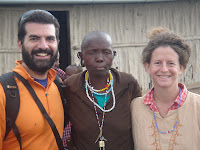Susan and Josh working with the refugees at tilling the soil

Josh walking with a group of refugees through the market

Just back from a week in Kyangwali refugee settlement, on the Uganda-Congolese border. Kyangwali is one of several sites in Uganda where refugees live on land that has been specially appropriated for them. (Unlike camps that Susan has visited before, where refugees are kept in camps and need to depend upon international aid for food, refugees in Uganda get their own piece of land to farm and live off the food they harvest).
It was an unforgettable week. Despite no electricity, incredibly basic meals, and absolutely no amenities, we had a very, very special time.
The refugees with whom we spent time had been through very tough times, as you might imagine - some were orphans, some had been raped, or injured with bullets. (We worked primarily with Congolese refugees from the North Kivu region of the DRC, although Kyangwali also hosts several thousand Sudanese refugees.)
In addition to hardships too numerous to mention, the refugees face current challenges that blew us away: they produce their own food (digging, clearing the land, planting, harvesting, all year long), build their own mud huts, make their own shoes and clothes.
We two, with our advanced degrees - we can't do any of that. What can we do? Write a paper? Big deal.
The students we met were inspiring. While there is primary school in the camp, it still costs money to get books, supplies, and fuel for studying at night (remember, no electricity - and the sky is pitch black with spectacular stars), so students do extra work (digging mostly) to earn money.
There is no secondary school in the camps, which means there is only one way for students to learn past grade 8: somehow raise the money to study in Hoima, the closest town, two hours away. There, they have to pay tuition and board. There is simply no way to make this kind of money on the settlement; the refugees are dependent upon the generosity of outsiders if they want to study.
Despite their histories and, literally, having almost nothing, the community welcomed us in. We were amazed at the perseverance, optimistic attitudes, generosity of spirit and resources, strong sense of community, and constant level of friendliness we were shown. These kids (we dealt mainly with 16-24 year-olds) were truly remarkable and inspiring to us.
Here are some of our favorite moments:
-When telling one refugee that Susan grew up in an apartment building (like a very tall house) that was big enough for more than 120 families, he asked, "Did all 120 families build the apartment together?"
-One refugee knew about carbon dating but had never heard of dinosaurs or the Big Bang.

-Susan taught several refugees a song in Hebrew -- they picked it up in about fifteen minutes. They REALLY know how to sing. Then she learned a song about Jesus in Swahili. (Ask her to sing it. It's a catchy melody and she still hasn't forgotten it.)
-Susan and Josh were asked to speak in church. Susan explained that they were Jewish, after which she had a very entertaining conversation with a recently arrived refugee in which she tried to explain, in French, that Jews do not believe that Jesus is the Messiah (reaction to this: incredulous laughter from all sides).
-We were in Kyangwali on US Inauguration Day (and we were able to watch the Inauguration thanks to the one solar powered TV nearby) and Susan gave a little talk to the students about Obama's presidency and why this didn't necessarily mean that all of Africa's problems would be immediately solved. Josh's favorite part was when Susan got herself all worked up and tried to explain that blue states are mostly coastal. The children's eyes sort of glazed over at this point but Susan just kept right on talking.



-We also did a drama workshop in which the students got to act out small scenes cut out from magazine ads and use their voices and faces to display emotion, without using words.
This is a wonderful and special community to which we felt quite close when we left. For more information or if you'd like to be involved, financially or time-wise, contact us directly.

















































